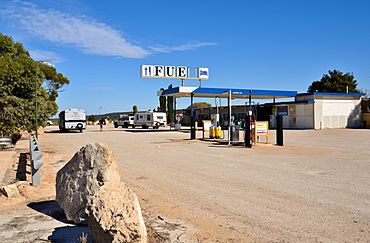Mundrabilla, Western Australia facts for kids
Quick facts for kids MundrabillaWestern Australia |
|||||||||
|---|---|---|---|---|---|---|---|---|---|

Mundrabilla Roadhouse, 2017
|
|||||||||
| Established | 1872 | ||||||||
| Postcode(s) | 6443 | ||||||||
| Elevation | 20 m (66 ft) | ||||||||
| Area | [convert: needs a number] | ||||||||
| Location | |||||||||
| LGA(s) | Shire of Dundas | ||||||||
| State electorate(s) | Eyre | ||||||||
| Federal Division(s) | O'Connor | ||||||||
|
|||||||||
Mundrabilla is a very small place in the far southeast of Western Australia. It is in an area where very few people live. The two main spots here are Mundrabilla Roadhouse and Mundrabilla Station. These two places are about 35 kilometres (22 mi) apart. In 2016, a census showed that only 23 people lived in Mundrabilla. Most of them were female. The local time zone is UTC+08:45.
Contents
Exploring Mundrabilla's Roadhouse
Mundrabilla Roadhouse is a small community found along the Eyre Highway. This highway crosses a huge, flat area called the Nullarbor Plain. The roadhouse is on the Roe Plains, which is a bit lower than the Nullarbor. It is about 66 kilometres (41 mi) west of Eucla. The Great Australian Bight (a large bay) is also nearby, about 20 kilometres (12 mi) to the south. Roger and Pat Warren-Langford built this roadhouse. They used to manage Mundrabilla Station before that.
History of Mundrabilla Station
Mundrabilla Station was the very first sheep farm in the Nullarbor area. It was started in 1872 by three men: William Stuart McGill from Scotland, and Thomas and William Kennedy from Ireland. Thomas Kennedy passed away in 1896. William McGill's first wife, Annie Harkness, died in 1879 during childbirth. Both Annie McGill and Thomas Kennedy are buried at Mundrabilla Station. McGill later married Ellen Angel Fairweather in 1889.
Mundrabilla's Climate and Weather Records
Mundrabilla has a typical arid climate, which means it's very dry. However, because it's close to the ocean, its summers are not as hot as many other Australian deserts. Even so, Mundrabilla Station holds a record for one of Australia's hottest temperatures ever. On January 3, 1979, the temperature reached 49.8 °C (121.6 °F).
| Climate data for Mundrabilla Station | |||||||||||||
|---|---|---|---|---|---|---|---|---|---|---|---|---|---|
| Month | Jan | Feb | Mar | Apr | May | Jun | Jul | Aug | Sep | Oct | Nov | Dec | Year |
| Record high °C (°F) | 49.8 (121.6) |
48.6 (119.5) |
44.8 (112.6) |
40.4 (104.7) |
36.4 (97.5) |
27.6 (81.7) |
30.1 (86.2) |
33.5 (92.3) |
39.0 (102.2) |
43.1 (109.6) |
46.0 (114.8) |
45.7 (114.3) |
49.8 (121.6) |
| Mean daily maximum °C (°F) | 29.6 (85.3) |
29.4 (84.9) |
27.4 (81.3) |
26.0 (78.8) |
22.2 (72.0) |
19.5 (67.1) |
19.2 (66.6) |
20.5 (68.9) |
22.5 (72.5) |
25.5 (77.9) |
27.3 (81.1) |
28.7 (83.7) |
24.8 (76.6) |
| Mean daily minimum °C (°F) | 15.7 (60.3) |
15.9 (60.6) |
14.7 (58.5) |
12.5 (54.5) |
10.3 (50.5) |
8.0 (46.4) |
7.0 (44.6) |
7.3 (45.1) |
8.3 (46.9) |
10.5 (50.9) |
12.2 (54.0) |
13.7 (56.7) |
11.3 (52.3) |
| Record low °C (°F) | 8.3 (46.9) |
3.9 (39.0) |
7.3 (45.1) |
4.2 (39.6) |
2.7 (36.9) |
0.1 (32.2) |
−1.0 (30.2) |
−0.2 (31.6) |
−1.2 (29.8) |
0.2 (32.4) |
2.7 (36.9) |
6.5 (43.7) |
−1.2 (29.8) |
| Average rainfall mm (inches) | 15.9 (0.63) |
19.2 (0.76) |
19.3 (0.76) |
21.4 (0.84) |
25.9 (1.02) |
25.9 (1.02) |
22.2 (0.87) |
22.9 (0.90) |
18.8 (0.74) |
18.3 (0.72) |
16.0 (0.63) |
18.2 (0.72) |
244 (9.61) |
| Average rainy days (≥ 0.2mm) | 2.6 | 3.3 | 4.6 | 5.2 | 7.8 | 8.2 | 7.7 | 7.2 | 5.6 | 4.2 | 3.5 | 3.2 | 63.1 |
| Source: Bureau of Meteorology | |||||||||||||
Mundrabilla Today: A Stop on the Highway
Just like other places in the Nullarbor Plain area, Mundrabilla mainly consists of its roadhouse. The roadhouse is open every day from 6:00 AM to 9:30 PM. It even has a small wildlife park. Here you can see animals like emus, camels, and birds in an aviary. People still raise animals on farms in this area.
The Amazing Mundrabilla Meteorite
The Mundrabilla meteorite is the biggest meteorite ever found in Australia. It weighs a massive 12.4 tonnes (12.2 long tons; 13.7 short tons)! Geologists R.B. Wilson and A.M. Cooney discovered it in 1966 during a survey. This huge rock is part of what is called the "Mundrabilla Mass." Another large piece weighs 5.08 tonnes (5.00 long tons; 5.60 short tons). In total, about 22 tonnes (22 long tons; 24 short tons) of meteorite pieces have been found here. These pieces are spread out over a 60 km (37 mi) area. This makes Mundrabilla one of the largest meteorite sites in the world. Scientists believe these fragments crashed to Earth at least one million years ago.
 | Aurelia Browder |
 | Nannie Helen Burroughs |
 | Michelle Alexander |


